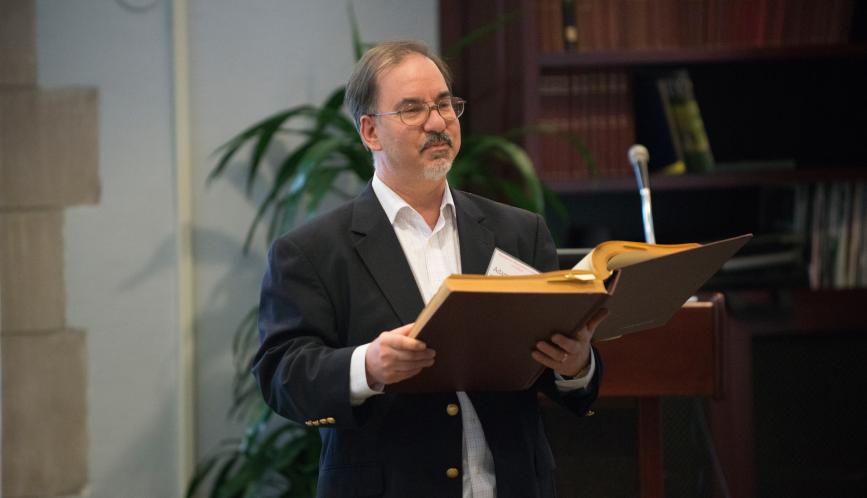Adam Gamoran, an MIP network member, is President of the William T. Grant Foundation and Emeritus MacArthur Professor of Sociology and Educational Policy Studies at the University of Wisconsin-Madison. Since joining the Foundation, he has launched a new initiative to support research on reducing inequality in youth outcomes, and has continued the Foundation’s ongoing work to improve the use of research evidence in policy and practice decisions that affect young people. His research focuses primarily on inequality in education and school reform. Gamoran is an elected member of the National Academy of Education and the American Academy of Arts & Sciences and was twice appointed by President Obama to serve on the National Board for Education Sciences. He earned his Ph.D. in Education from the University of Chicago in 1984.
Describe your area of study and how it relates to current policy discussions surrounding inequality.
My own research focuses on educational inequality, but since 2013 I have led the William T. Grant Foundation – which supports research to improve the lives of young people ages 5-25 in the United States – and in this role I have the opportunity to help shape the broader body of scholarship on inequality. Our grantmaking focuses on two areas, both of which are closely tied to current policy discussions surrounding inequality: we support research on programs, policies, and practices to reduce inequality in youth outcomes, and research on improving the use of evidence in policy and practice decisions that affect young people.
Much of the social science of inequality focuses on measuring the extent of inequality, identifying its sources, and assessing its consequences. While this is important, in many areas of inequality we know enough about its nature to build and assess responses to inequality. Hence, we are calling on social scientists to move from understanding inequality to reducing inequality. We seek this shift for four reasons. First, inequality in the U.S. today is excessive, whether compared to our own past history or in comparison to other developed nations in 2019. Second, excessive inequality is harmful: it is a drag on our economic productivity and it is socially divisive. Third, we are not paralyzed in the face of increasing inequality; on the contrary it is empirically demonstrable that inequality responds to social policy. (See the recent National Academies report on A Roadmap to Reducing Child Poverty, which we helped support, for a recent example.) Fourth, we need research to identify effective programs, policies, and practices to reduce inequality, so we have taken up this charge and call on the research community to respond.
Yet even as evidence on ways to reduce inequality (and other ways to benefit youth) accumulates, the evidence is rarely used to enact and implement better policies and practices. For a decade, our foundation has supported research on the use of research evidence. Initially this research helped identify the barriers to evidence use (often it is not timely, relevant, or accessible), and conditions that fostered evidence use (e.g., relationships of trust between producers and consumers of evidence, and intermediary organizations who bring producers and consumers together). Since 2015, we have supported research to test ways to improve the use of evidence; build tools to facilitate evidence use; and incentivize researchers to produce useful evidence that gets used.
What areas in the study of inequality are most in need of new research?
When we launched our new focus on reducing inequality in 2014, we commissioned papers in four areas that we thought were especially ripe for new research on ways to reduce inequality: immigrant-origin families and children; child and adolescent mental health and mental health services; the juvenile and criminal justice system; and postsecondary education and workforce development. Each of these areas continues to stand out as areas that call out for new research.
In the policy realm new laws that have been passed (or reauthorized) that have created new opportunities to test approaches for reducing inequality in youth outcomes. In education, the Every Student Succeeds Act (2015) calls on states to use evidence to improve low-performing schools. In child welfare, the Families First Prevention Services Act (2018) encourages states to fund services to help families stay together instead of removing children to foster care. In juvenile justice, the Juvenile Justice Reform Act (2019) was reauthorized with opportunities to fund delinquency prevention programs, alternatives to incarceration, and other initiatives that may help reduce disparities. Each of these domains offers fertile grounds for research.
What advice do you have for emerging scholars in your field?
I encourage emerging scholars to examine what we know about the extent and sources of inequality, and advance new work to examine ways to respond. Although testing interventions is part of this agenda, it is not the whole of it. We need research from a variety of disciplinary and methodological perspectives to identify ways to build and understand – as well as test and improve – programs, policies, and practices to reduce inequality. Otherwise my advice to emerging scholars in this field is the same as that for scholars in any field: ask important questions, bring disciplinary knowledge to bear on the questions, use methods that are aligned with the questions, and propose interpretations that are aligned with the methods.



